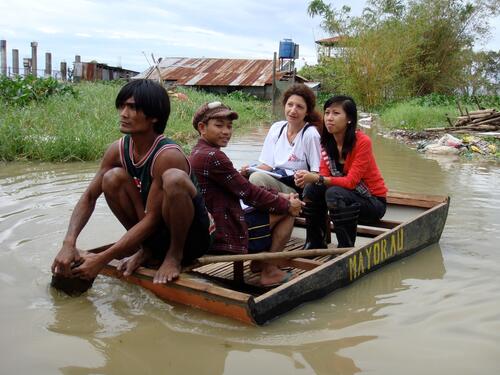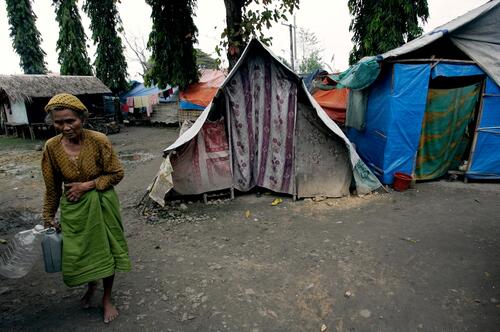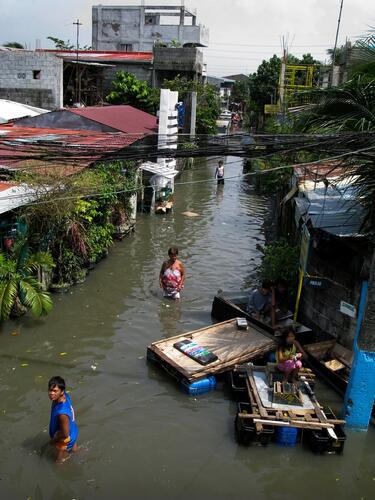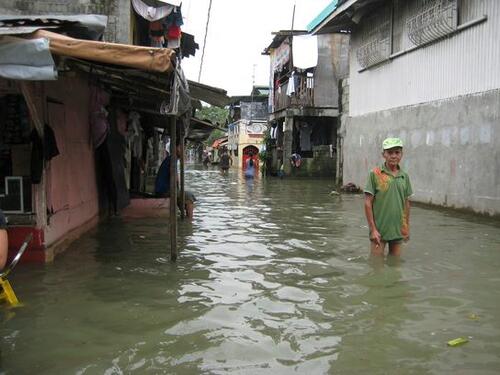In Manila and surrounding areas, tens of thousands of people are still living in very critical conditions in crowded evacuation centres or partially flooded houses. These living conditions expose the population to waterborne and contagious diseases and close medical follow-up is critical.
In the slums near a canal east of Manila, and in all affected areas of Laguna Bay, Médecins Sans Frontières (MSF) has been running mobile primary health care clinics with referrals to local hospitals.
“The most frequent diseases we see are respiratory and skin infections as well as diarrhoea cases,” explained emergency coordinator Pierre Luigi Testa. “Some of our teams also assist the Department of Health with the national vaccination campaign for measles and ensure tetanus vaccines are provided to those in need.”
MSF has conducted more than 2,220 consultations since the beginning of the emergency and also offers mental health support to flood victims when needed. In the crowded evacuation centres, MSF has set up 50 latrines, while in the flooded areas where people are staying in makeshift houses, MSF runs excreta disposal activities to reduce the risks of contamination, as most latrines remain underwater. MSF has also provided sanitation kits with chlorine and brushes to improve hygiene in some of the evacuation centres. In some of the neighbourhoods around Laguna Bay, MSF is supporting the control and surveillance of possible cases of leptospirosis, a bacterial infection caused by exposure to animal urine, and diarrhoea.
MSF also supports the Department of Health in the treatment of patients, sanitation activities, and health promotion in communities in the areas where there has been an increase in acute watery diarrhoea. Thirteen water tanks will also be provided to ensure safe stocks of water.
More than 17,000 people have received hygiene kits from MSF in Manila and surrounding areas. These include hygiene items such as soap and tooth brushes as well as cooking utensils and blankets. Materials to build shelters were also distributed in some of the places where people had lost their houses.
Meanwhile, MSF teams have also intervened in Ilocos Norte, Cagayan, Pangasinan and Tarlac provinces, in the northern island of Luzon, where typhoon Parma has wreaked havoc after weeks of continuous heavy rain. In Pangasinan and Tarlac provinces, dozens of cities and communities where flooded after the authorities released water from local dams to prevent them from overflowing after typhoon Parma’s torrential rain. MSF has conducted over 1930 medical consultations and distributed 6700 hygiene kits as well as 520 construction kits where houses had been damaged or destroyed. Another 6000 hygiene kits and 600 construction kits should be distributed next week.
MSF's water and sanitation team have begun the construction of 40 latrines for displaced families in Rosales, Pangasinan province. Following an assessment in Benguet province, MSF is also planning to provide construction kits where communities were devastated by severe mudslides after weeks of heavy rain. After hitting the Philippines, tropical storm Ketsana also struck Vietnam, killing dozens and flooding populated areas. MSF sent a nurse and a logistician to assess the needs of victims in Da Nang, Hoi An, Quang Ngai, and Kontum in central Vietnam. As a number of other organisations are responding, MSF has chosen not to begin an emergency intervention in these areas.






